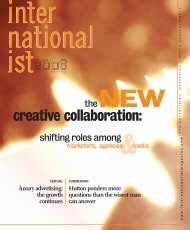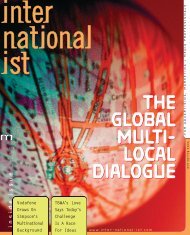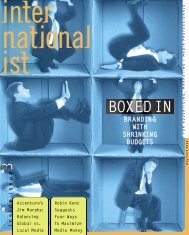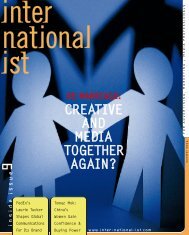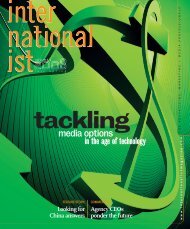4 - Internationalist
4 - Internationalist
4 - Internationalist
You also want an ePaper? Increase the reach of your titles
YUMPU automatically turns print PDFs into web optimized ePapers that Google loves.
R E T U R N T O R O B U S T A D M A R K E T<br />
What shifts are you seeing that are<br />
particular to the German market?<br />
Michael Dunke, Universal McCann: In Germany<br />
there are currently two major developments. The first is the<br />
shift of ad investments from press (magazines,<br />
newspapers) to digital media. Digital media means with<br />
focus to online and increasingly to mobile. Today digital<br />
media is no longer an exception, but a basis for nearly all<br />
communications planning. The second is a big challenge<br />
specific to Germany, and that is the fundamental change in<br />
the TV offer systems caused by law. The German Anti-trust<br />
Agency has defined the country’s TV market as duopolistic.<br />
As a result, media practice has changed, and the current<br />
situation is insecure for all market partners.<br />
Bob Breen, GWP/Handelsblatt: Technical<br />
developments are the main catalyst in German media —<br />
whether it’s traditional TV or radio being upgraded from<br />
analogue to digital or new mobile applications for the<br />
market. The trend toward media convergence is<br />
unmistakable. Some of the media communications<br />
solutions in the new media and new facilities are still in<br />
the test phase, especially with community advertising.<br />
Micro-targeting and higher efficiency are the characteristics<br />
of future “integrated/cross media campaigns.<br />
Michael Monheim, Axel Springer: Although the<br />
German consumer is not an early adapter, the shift towards<br />
online is a pronounced trend in terms of media<br />
consumption, advertising and integrated cross media<br />
marketing. Print is still an important communication<br />
channel, although it is losing shares in younger target<br />
groups. Print publishers also increasingly try to shift their<br />
competence from print to the web. Consumers take the<br />
internet for granted in terms of media usage, especially<br />
since flat rates for higher and faster internet connections<br />
have made it accessible to everyday-life.”<br />
How are media solutions different now?<br />
Luc Samama, DAVINCI SELECTWORK: Integration is<br />
developing and finally moving from a buzzword into<br />
reality. And the growth of online is universal. But Germans<br />
are still ‘Bean Counters.’ ROI and effectiveness/efficiency<br />
measurement are becoming of paramount importance.<br />
Elaborate analytical tools are being launched, and<br />
McKinsey is selling more “MSE” (Marketing Spend<br />
Effectiveness) analyses to big corporate clients than ever.<br />
With media becoming more measurable and accountable<br />
than other disciplines, media suppliers’ certainly have<br />
much resting on their shoulders.<br />
The agency markets seems to be getting a little shaken up,<br />
as antitrust regulations now make rate calculation<br />
advertiser-dependent, rather than buying networkdependent.<br />
Plus, more clients are looking for better<br />
integrated communications solutions, which allows for<br />
many newer or smaller shops to take on larger roles.”<br />
Andrea Holzschneider, SPIEGEL-Verlag: On<br />
principle it can be found that media spending has<br />
recovered again since the collapse in 2000/2001. By 2006,<br />
figures had once again reached, and even surpassed, the<br />
level of 2000. According to Nielsen Media Research, gross<br />
spending for 2006 was distributed as follows: television:<br />
45%, print: 42% (newspapers: 22%, magazines: 18%,<br />
specialist journals: 2%), radio: 6%, online: 4% and outdoor<br />
advertising: 3%. The Nielsen advertising statistics are the<br />
most common source of data in Germany. However it<br />
should be noted that they are based entirely on gross<br />
scores, and that some online organizations, such as<br />
Google, do not report their figures.”<br />
“Germany feels good about itself. We are World Cup<br />
Champions, Field Hockey World Champions, Ladies’ Soccer<br />
World Champions, Handball World Champions, Export World<br />
Champions, Nobel Prize Winners and Pope. That is all good<br />
atmospheric stuff for consumer spending and ad spending.”<br />
Bob Breen, International Business Director<br />
GWP media-marketing GmbH/Division of Handelsblatt, Düsseldorf<br />
r.breen@vhb.de<br />
www.internationalistmagazine.com<br />
27



